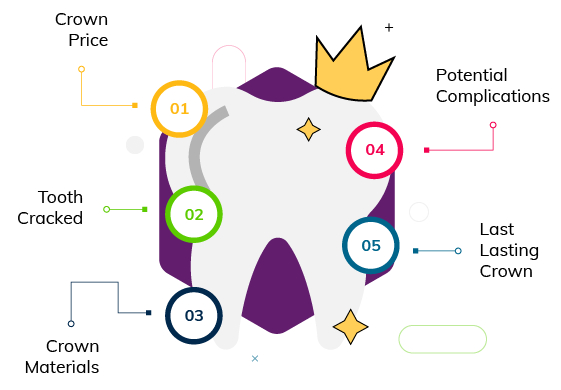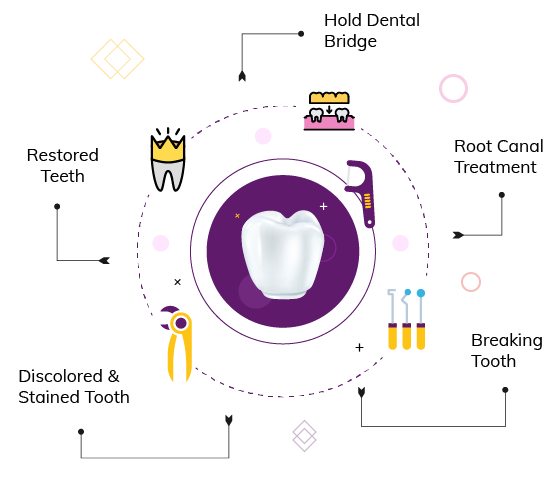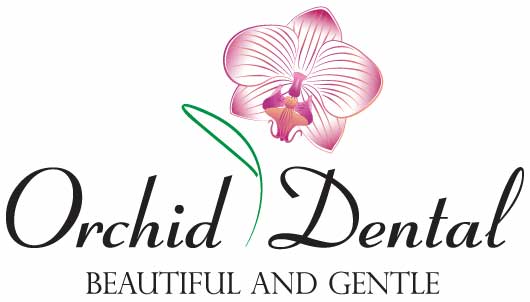
Dental Crowns
A dental crown (or cap) is a covering that encases the entire tooth’s surface, restoring it to its original shape and size. Dental crowns protect and strengthen tooth structure that cannot be restored with dental fillings or other types of dental restorations.
Dental crowns are made and customized in size, shape, and color to match your natural teeth. This is done to restore full functionality to your teeth and to provide optimal cosmetic results for your smile. Please contact our dental clinic to learn about your treatment options for enhancing the beauty and functionality of your smile.

Who Needs a Dental Crown?
If you have a cavity that is too large or extensive to be treated with fillings or other restorations, you may need a dental crown. Likewise, if your tooth is cracked or worn out beyond repair, it’s time for crown placement. Also, dental crowns are required to cover dental implants, hold a dental bridge in place, or for cosmetic dentistry purposes (i.e. to cover misshapen or discolored teeth).
Different Types of Crowns
Gold crowns, all-porcelain crowns, porcelain-fused-to-metal crowns, zirconia crowns, and E-MAX: Lithium Disilicate crowns are some of the different types of crowns available with porcelain crowns being the most popular.
Price
A dental crown can cost you anywhere between a few hundred dollars and few thousand dollars. Factors that influence the cost is the material you choose and the related procedures that are required in order for the crown to be correctly placed.
Dental Crown Procedure
The dental crown procedure will usually take place over the course of two dental appointments. The first dental appointment will consist of taking several highly accurate molds (impressions). These molds will be used to help create both your finalized porcelain crown, and a temporary crown. Once the molds have been taken, your porcelain crown will be custom-fabricated in a dental laboratory over the course of approximately two weeks. During this time, you will wear a temporary crown. In preparation for the temporary dental crown, the dentist will numb your tooth, and clean any decay. Your tooth will be shaped to properly fit the crown.
At your second dental appointment, the temporary crown will be removed. The dentist will prepare your tooth for the final permanent crown by carefully cleaning your tooth again. The new crown will be placed to ensure that full functionality will be restored to your mouth. Instructions will be given by your dentist regarding your new dental crown. You will be encouraged to have regular dental visits to ensure your new crown remains in good shape.
Durability of Crowns
Crowns are made to last at least a decade, and with correct care, can even last a lifetime. Maintaining good daily oral hygiene by brushing and flossing is essential for the longevity of your dental crowns. Regular visits to your dentist for preventive care and early diagnoses will also help your crown last longer. We also recommend that you avoid very hard and sticky foods where possible to prevent possible damage to your crown.
Patients who grind their teeth are recommended to wear a night guard to protect the crown as well as their other teeth.
Potential Complications
Poor oral hygiene is one of the top causes of dental crown complications, sometimes resulting in the crown becoming loose. For some rare cases, crowns may cause gum irritation caused by allergies. If you have any known allergies, especially to any types of metal, it is important to disclose these to your dentist prior to receiving your dental crown procedure. An all-porcelain crown is often recommended for patients with known metal allergies.
Are you in the Aurora, CO area, and considering getting a dental crown? Contact us today!

Reasons You May Need Dental Crowns
Prevent Weak Tooth From Breaking
Dental crowns can help prevent weak teeth from breaking or falling apart by holding the pieces together and strengthening it.
To Hold a Dental Bridge
Your dental crown helps to keep the dental bridge in place. The crown also enhances the bridge’s appearance.
To Protect Restored Teeth
If you have undergone root canal therapy to restore decayed or damaged teeth, dental crowns will safeguard your restored tooth from any microbial infection and give the tooth a restored appearance.
To Cover a Discolored or Stained Tooth
Crowns are sometimes used to mask discolored teeth. Similarly, stains that are tough and can’t even be removed by professional whitening can be covered by crowns.
Do you need dental crowns in the Aurora, CO area? Contact us today to inquire!
Other Related Procedures
Dental Crown Lengthening
Crown lengthening is a common dental surgery. There are two main reasons why crown lengthening is performed. The first happens when a tooth needs to be restored and there is not enough tooth exposed to support a filling or crown. The other reason crown lengthening is performed is to remedy a “gummy smile.”
Procedure
First, anesthesia is applied to the immediate area and the neighboring teeth. Cuts are then made that pull the gums away from the teeth, exposing teeth roots and the surrounding bone. In most cases, both gum and bone will need to be removed from around the roots of the teeth. Once enough of the tooth has been exposed, the area will be washed with sterile salt water and the gums are stitched back together.
If you have questions about crown lengthening or want to set up an appointment, please call us today. Our friendly team is eager and willing to assist you.
Inlays and Onlays
Inlays and onlays, or partial crowns, are so called because a full crown is not needed to restore the damage or decay that has affected the tooth. This service is for cases in which a tooth has decay, but the decay has not destroyed all of the healthy enamel of the tooth. The inlay or onlay acts as the missing part of the tooth and is fitted to complete the natural tooth.
Typically, inlays are used when minimal damage or decay has occurred, and onlays are required when the damage or decay becomes more significant. Either way, the material that is used to fill the damaged or decayed area can be made to appear like natural teeth. This way, your tooth will look and feel like no damage or decay ever existed.
Procedure
The procedure is very similar to the crown procedure. As in the procedure for the crown, 2-3 visits may be needed to ensure optimal fitting and functionality of the restoration.
Once an inlay or onlay has been decided upon as the best solution for you, the procedure will begin with a thorough cleaning and a removal of all decay. Once your tooth is clean, an impression will be made. The impression will be sent to a dental laboratory where an individually crafted partial crown will be customized to fit your particular tooth. During this time, you will be provided a temporary partial crown to secure optimal comfort between visits.
After the partial crown is ready, it can be placed to provide final restoration. After the fitting is made and completed in the most comfortable and natural-feeling way, your inlay or onlay will be cemented and finalized.
On occasion a third visit may be necessary to ensure the fitting and cement. Once the inlay or onlay is finalized, it will provide you with the feel and appearance of one of your naturally grown teeth. You will have full functionality restored. If proper hygiene is practiced and if regularly scheduled dental visits are attended, inlays and onlays can have a long lifetime. If neglected, you may need to return to your dentist to repair damage made to your restoration.
Do you need crown lengthening, inlays, or onlays in the Aurora, CO area? Contact us today for a consultation!
Dental Crowns FAQs
What is a dental crown?
Dental crowns are strikingly similar to natural teeth in appearance and functionality, but are composed only of the top, visible portion. They are placed on top of existing teeth or dental implants to give the patient the appearance of a complete, healthy tooth.
What are the different types of crowns available?
Some of the commonly used types of crowns are gold crowns, all-porcelain crowns, porcelain-fused-to-metal crowns, zirconia crowns, and E-MAX: Lithium Disilicate crowns.
Is special care required for dental crowns?
The same care that is recommended for your natural teeth are highly emphasized for patients with dental crowns. Aside from routine oral hygiene practices such as regular brushing, flossing, and professional teeth cleaning, these include avoiding excessively hard or sticky foods and wearing a mouth guard for those who have a tendency to grind teeth.
Please give our office a call to make an appointment for a dental crown in the Aurora, CO area. Call us at (303) 671-0305 now!


